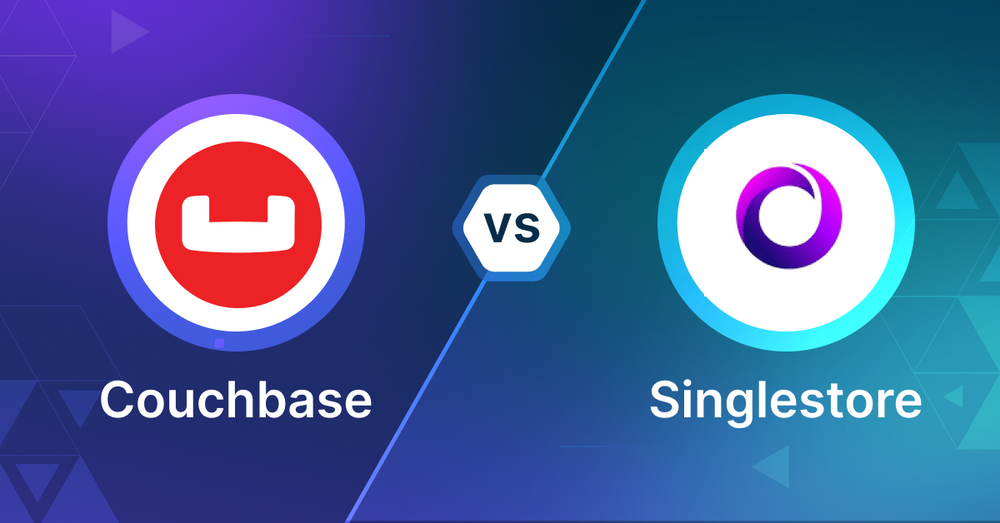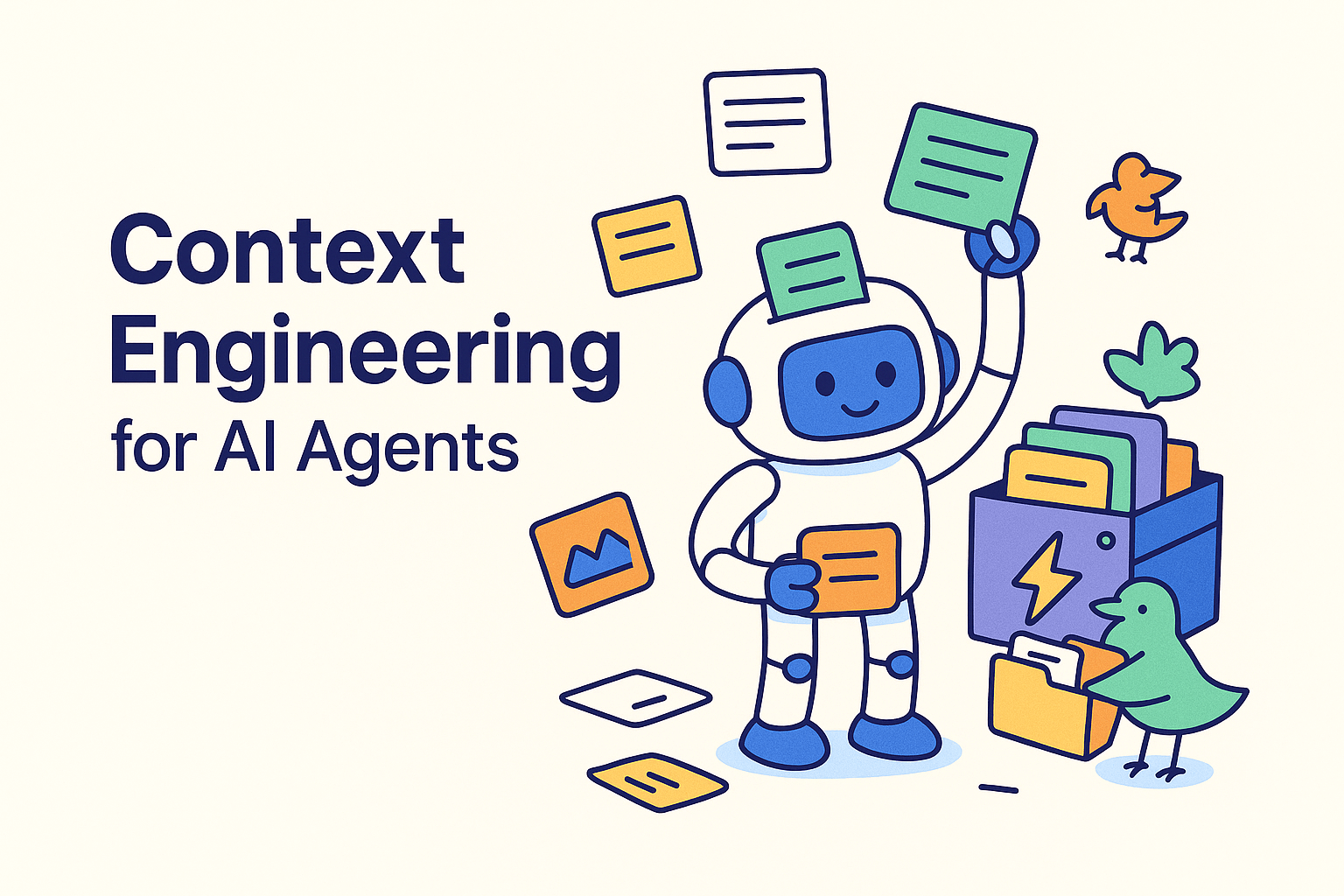Couchbase vs Singlestore: Choosing the Right Vector Database for Your AI Apps

What is a Vector Database?
Before we compare Couchbase and Singlestore, let's first explore the concept of vector databases.
A vector database is specifically designed to store and query high-dimensional vectors, which are numerical representations of unstructured data. These vectors encode complex information, such as the semantic meaning of text, the visual features of images, or product attributes. By enabling efficient similarity searches, vector databases play a pivotal role in AI applications, allowing for more advanced data analysis and retrieval.
Common use cases for vector databases include e-commerce product recommendations, content discovery platforms, anomaly detection in cybersecurity, medical image analysis, and natural language processing (NLP) tasks. They also play a crucial role in Retrieval Augmented Generation (RAG), a technique that enhances the performance of large language models (LLMs) by providing external knowledge to reduce issues like AI hallucinations.
There are many types of vector databases available in the market, including:
- Purpose-built vector databases such as Milvus, Zilliz Cloud (fully managed Milvus)
- Vector search libraries such as Faiss and Annoy.
- Lightweight vector databases such as Chroma and Milvus Lite.
- Traditional databases with vector search add-ons capable of performing small-scale vector searches.
Couchbase is distributed multi-model NoSQL document-oriented database and SingleStore is a distributed SQL database (formerly Memsql). Both offer vector search capabilities as an add-on. This post compares their vector search capabilities.
What is Couchbase? An Overview
Couchbase is a distributed, open source NoSQL database for cloud, mobile, AI and edge computing. It combines the best of relational databases with the flexibility of JSON. Couchbase also allows you to do vector search even though it doesn’t have native vector indexes. Developers can store vector embeddings—numerical representations generated by machine learning models—within Couchbase documents as part of their JSON structure. These vectors can be used in similarity search use cases such as recommendation systems or retrieval-augmented generation both based on semantic search where finding data points close to each other in a high dimensional space is important.
One way to do vector search in Couchbase is by using Full Text Search (FTS). FTS is designed for text search but can be used for vector search by converting vector data into searchable fields. For example, vectors can be tokenized into text-like data and FTS can index and search based on those tokens. This will give you approximate vector search and a way to query documents with vectors that are close in similarity.
Alternatively developers can store the raw vector embeddings in Couchbase and do the vector similarity calculations at the application level. This means retrieving documents and computing metrics such as cosine similarity or Euclidean distance between vectors to find the closest matches. This way Couchbase will be used as storage for vectors and the application will handle the math.
For more advanced use cases some developers integrate Couchbase with specialized libraries or algorithms that enable vector search. These integrations allow Couchbase to manage the document store and the external libraries will do the actual vector comparisons. This way Couchbase can still be part of a solution that does vector search.
By using these approaches Couchbase can be used for vector search functionality and be a flexible option for various AI and machine learning use cases that require similarity search.
What is Singlestore? An Overview
SingleStore is a distrbuted SQL database (formerlyMemsql) that combines relational database features with vector database processing. It has SQL support, distributed query processing, full-text search, ACID transactions and vector similarity search. It allows you to store and query both structured data and vector embeddings in one system, so you don’t need multiple specialized tools.
A big advantage of SingleStore is that it can handle vector data alongside regular database operations. Vector embeddings, which represent the semanticmeaning of objects like text or images as arrays of numbers, can be stored as blobs in SingleStore tables. You can then search those vectors using similarity functions like DOT_PRODUCT or EUCLIDEAN_DISTANCE. This is super useful for semantic search where you want to find results based on meaning not exact keyword matches.
SingleStore’s vector search has several benefits for developers and data engineers. By storing vector and relational data in one system, it minimizes data movement between different subsystems and potentially lowers operational costs and simplifies application architectures. The platform also supports hybrid searches that combine vector similarity with full-text search or other SQL operations so you have more options for complex queries.
For teams looking to add vector search capabilities, SingleStore makes it easy. Vectors can be loaded into the database using standard SQL INSERT statements, LOAD DATA commands or data pipelines. The system supports various embedding sources, including popular large language models and custom trained models. With SingleStore’s SQL interface it’s easy for teams already familiar with relational databases to get advanced vector search capabilities.
Key Differences
Search Methodology:
SingleStore offers vector search capabilities, allowing direct use of similarity functions like DOT_PRODUCT and EUCLIDEAN_DISTANCE on vector data stored as blobs. Couchbase, while not having native vector indexes, provides workarounds for vector search. It uses Full Text Search (FTS) by converting vector data into searchable fields, or relies on application-level calculations for vector similarity.
Data Handling:
SingleStore combines relational database features with vector processing, enabling storage and querying of both structured data and vector embeddings in a single system. Couchbase, as a NoSQL database, excels in handling JSON documents and offers flexibility for semi-structured and unstructured data, including the ability to store vector embeddings within JSON structures.
Scalability and Performance:
Both systems are designed for distributed environments. SingleStore's distributed query processing allows for efficient handling of large datasets and complex queries involving both relational and vector data. Couchbase's distributed architecture also supports scalability, but the performance of vector searches may depend on the chosen implementation method.
Flexibility and Customization:
SingleStore provides SQL-based querying and supports hybrid searches combining vector similarity with full-text search and other SQL operations. Couchbase offers flexibility in data modeling with its JSON document structure and allows for custom vector search implementations, either through FTS or external libraries.
Integration and Ecosystem:
SingleStore integrates well with SQL-based tools and supports various embedding sources, including popular large language models. Couchbase, being a NoSQL database, may require additional integrations or external libraries for advanced vector search capabilities but offers good support for mobile and edge computing scenarios.
Ease of Use:
SingleStore's SQL interface may be more familiar to teams with relational database experience, potentially easing the adoption of vector search capabilities. Couchbase might have a steeper learning curve for vector search, as it requires understanding of NoSQL concepts and potentially custom implementations for vector operations.
Cost Considerations:
SingleStore's unified approach might lead to lower operational costs by reducing the need for multiple specialized tools. Couchbase's cost efficiency may depend on the specific vector search implementation and any additional tools or services required.
Security Features:
Both systems offer security features typical of enterprise-grade databases. SingleStore provides standard SQL-based security models, while Couchbase offers NoSQL-oriented security features. The specific security needs of vector data should be considered in the context of each system's overall security model.
When to Choose Each
Couchbase: Use when you need flexible NoSQL data modeling with JSON documents, especially in mobile and edge computing. Good for applications that store and retrieve semi-structured or unstructured data and where vector search is a nice to have rather than the main feature. Couchbase is good for projects that require a distributed database with strong JSON document storage and retrieval and where you can implement custom vector search or integrate with external libraries for vector operations.
SingleStore: Use when you need both relational data and vector search. Good for applications that need to do complex queries combining traditional SQL with vector similarity searches. SingleStore is great for projects that need to integrate vector search inside a SQL environment, such as advanced analytics platforms, recommendation systems or semantic search applications that also need to handle structured data. Also good for teams that are already familiar with SQL and want to add vector search to their existing data infrastructure.
Summary
Couchbase’s strengths are in its NoSQL architecture, JSON support and mobile and edge computing. It’s a general purpose platform that can handle different types of data and can do vector search through custom implementations or integrations.
SingleStore is a unified solution for both relational and vector data with native vector search inside a SQL environment. It’s good at combining database operations with vector processing for complex analytics workloads.
Choose between Couchbase and SingleStore based on your use cases, data types and performance requirements. If your project is mostly JSON documents and you need flexible data modeling with vector search as a nice to have, Couchbase might be the way to go. If your application needs to do complex queries with both structured data and vector similarity searches and you want SQL compatibility, SingleStore might be the better choice. Consider your team’s expertise, existing tech stack, scalability requirements and how important vector search is in your overall application architecture when making your decision.
While this article provides an overview of Couchbase and Singlestore, it's key to evaluate these databases based on your specific use case. One tool that can assist in this process is VectorDBBench, an open-source benchmarking tool designed for comparing vector database performance. Ultimately, thorough benchmarking with specific datasets and query patterns will be essential in making an informed decision between these two powerful, yet distinct, approaches to vector search in distributed database systems.
Using Open-source VectorDBBench to Evaluate and Compare Vector Databases on Your Own
VectorDBBench is an open-source benchmarking tool designed for users who require high-performance data storage and retrieval systems, particularly vector databases. This tool allows users to test and compare the performance of different vector database systems such as Milvus and Zilliz Cloud (the managed Milvus) using their own datasets and determine the most suitable one for their use cases. Using VectorDBBench, users can make informed decisions based on the actual vector database performance rather than relying on marketing claims or anecdotal evidence.
VectorDBBench is written in Python and licensed under the MIT open-source license, meaning anyone can freely use, modify, and distribute it. The tool is actively maintained by a community of developers committed to improving its features and performance.
Download VectorDBBench from its GitHub repository to reproduce our benchmark results or obtain performance results on your own datasets.
Take a quick look at the performance of mainstream vector databases on the VectorDBBench Leaderboard.
Read the following blogs to learn more about vector database evaluation.
Further Resources about VectorDB, GenAI, and ML
- What is a Vector Database?
- What is Couchbase**? An Overview**
- What is Singlestore**? An Overview**
- Key Differences
- When to Choose Each
- Summary
- Using Open-source VectorDBBench to Evaluate and Compare Vector Databases on Your Own
- Further Resources about VectorDB, GenAI, and ML
Content
Start Free, Scale Easily
Try the fully-managed vector database built for your GenAI applications.
Try Zilliz Cloud for FreeKeep Reading

Context Engineering Strategies for AI Agents: A Developer’s Guide
Learn practical context engineering strategies for AI agents. Explore frameworks, tools, and techniques to improve reliability, efficiency, and cost.

How to Build RAG with Milvus, QwQ-32B and Ollama
Hands-on tutorial on how to create a streamlined, powerful RAG pipeline that balances efficiency, accuracy, and scalability using the QwQ-32B model and Milvus.

How to Use Anthropic MCP Server with Milvus
Discover how Model Context Protocol (MCP) pairs with Milvus to eliminate AI integration hassles, enabling smarter agents with seamless data access and flexibility.
The Definitive Guide to Choosing a Vector Database
Overwhelmed by all the options? Learn key features to look for & how to evaluate with your own data. Choose with confidence.